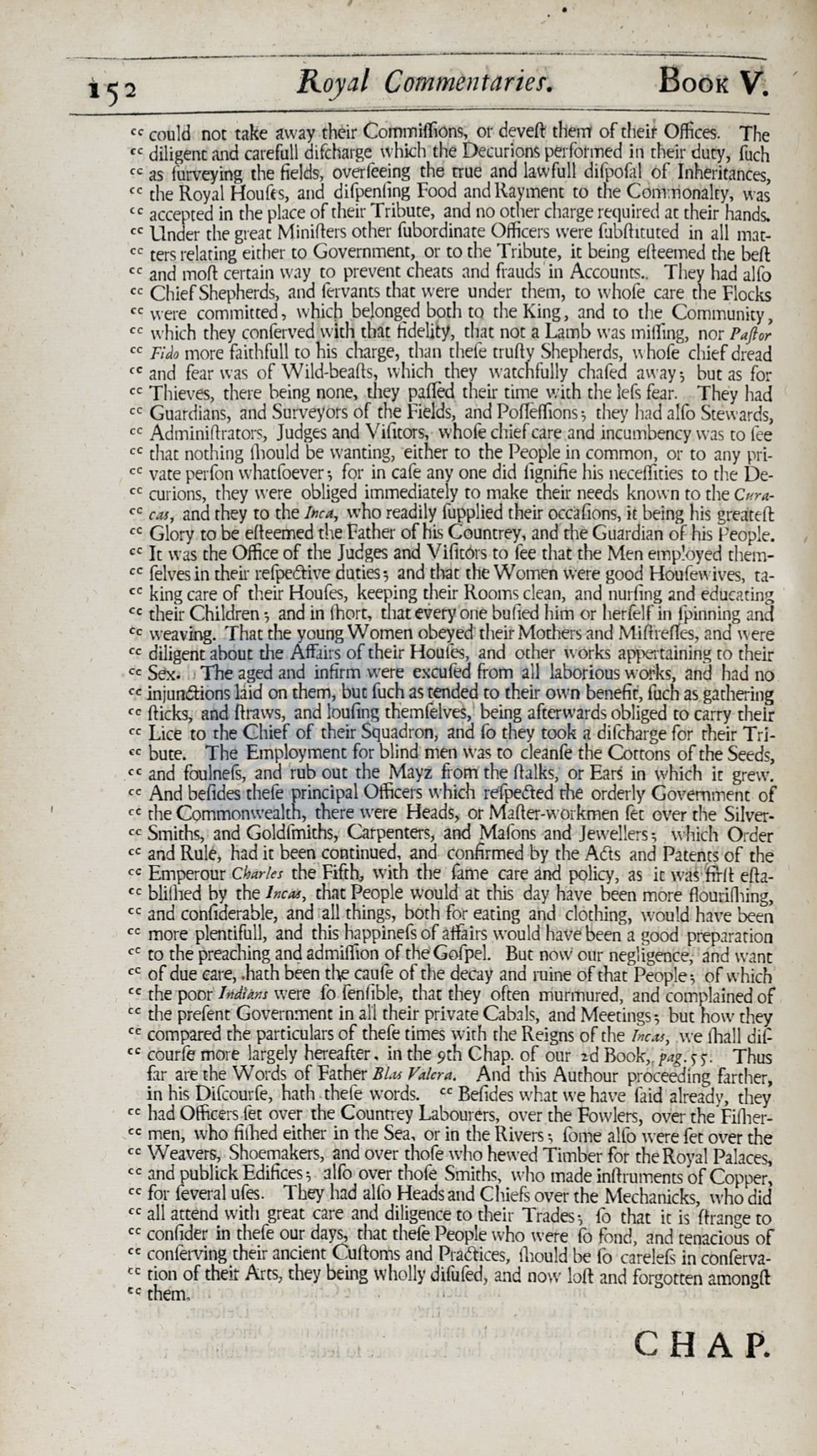

.Royal
Comméniariú~
ce
cwulB. not
ta.kectway .fü~ir
Cóinrniai~ms~_
ot devefil
tlié'rri
of thei! O~ce9. The
ce.
dilig€nt an
d carefull dirtnarge ,~hiGh
tljei
JDec;unonS pé'rfot1'!1ed in their
duc-y,
fuch
ce
as
fuuv.eying the fieldls, overfeemg the true and lawfull d1fpofa:l ,~f !nherit,ances,
ce
che Royal Hou[es, and difpenÍlng Food and Raymem to the Corn:nonalry, was
ce
accepted in che place
~:>f
rheir Tribute, ~nd no other charge requi!·ed ac t~eir hands.
ce
Under rhe greac Mimíl:ers other fübordmate O~cers w~re f,~bíhcuted m all nm–
ce
ters relaring either
to
Government, orto the Tribu~~' 1t bemg efieemed the beíl:
ce
and moíl: certain way to prevent cheats and frauds m Accouncs.. They had alfo
ce
ChiefShepherds, and fervancs that were under th~m, to who[e care ~he I:locks
ce
were committed, whicp belonged both to the Kmg, and to che Communicy,
ce
which rhey c;cmferved with ~bac fidelit1, that noca La111b was mifling, nor
Paflor
ce
Fido
more faichfull
to
bis charge, chan thefe truíly Shepherds, who[e chief dread
ce
and fear \,Vas of Wild-beaíls, which chey watchfülly chafed away j but as for
ce
Thieves, there being none, they paífed their time wirh the le[s fear. They had
ce
Guarclians, and Surveyots óf the Fiel'ds, and Poffeflions j they had alfo Stewards,
ce
Adminiíl:rators, Judges and Vificors, who[e chiefcare ,and incumbency was
to
[ee
ce
rhat norhing fhould be wanting, ·eirher to the People in common, or to any pri–
cc
vate perfon whacfoever j for in cafe any one did fignifie his necef!ities to rhe De–
ce
curions, they were obliged immediately ro make rheir needs known
to
rhe
Cura–
ce
c,u
1
and rhey to che
Inca,
who readily fupplied cheir oqéalions, ir being his greareíl:
ce
Glory
to
be eíleerned the Pather ofhis Ccmncrey, and
che
Guardian of.:·his People.
ce
le was che Office of the Judges and VHltórs to fee that the Meo emp'.oyed rhem–
cc
felves in their i:efpeétive du_ties; and tl~~t:che Women Were good Houfowives, ca–
ce
king care of cheir Hou[es, keeping c_heir Roomsclean, and nurfing ,md edilcating
ce
their Children j and in fh0rt, tbat tvefy olie bufied him or herfelf in fpinning and
te
weaving. That the youngWomen obeyed-theit Mochers and Mi(freífes, and were
ce
diligerit abouc che Affairs of their Houfes, and ocher works appertaining to their
ce
Sex.
1,
1be.aged and inf.irm were excufüd from all labotious wot;ks, and had no
ce
injumfüons Jáid on them; bun füch as nended to cheir 0wn benefic, Cuch-as.gachering
ca
fücks:11
aiÍ!G!
füaws, ami loufing th'em(elve
,l
being afterwards obliged to carry their
ce
Lice to rhe ~bief of their $quadron, arid
fo
~bey took a difcharge for rheir Tri–
ce
buce. The Employmenc for blind:mén ,vas to cleanfe the Cocrons of the Seeds,
_ce
and foulnefs, and 'rub out the Mayz fi-omthe ílalks, or Ears in which ir grew.
ce
And beíldes the[e principal Officers whieh ref.peéted rhe orderly Govemment of
ce
che <Z:9mmonwealth, there were Heads,, or Mafler-workrnen [éc 0ver tne Silver–
cc
Smiths, and Gold[michs, Carpentérs, a0d Ma.fons -and Jewellers; ¼il1ich Order
ce
and Ruléi liad it been coi:ltinued, and. conf.irmed by che Aéts and Patents of che
ce
Emperour
Chiirles
the'FifrhJ with che fame care
ánd
policy, as ic wa
1
Ji'rH
eíla–
cc
blifhed by the
lnc,u,
cHat People Wo9ld at chis day have been more flouriíl1ing,
ce
and,confiderable, and tall things, borh
for
eating and clóthing, would have been
ce
more plenrifull, and this happinefs of affairs would havé~een a good preparation
ce
to the preaching anq admiffion pf the G€)fpel. Bue no,v our negligence; and want
ce
of due eare, .hath been the caufe of the decay and ruine of rhat People j of which
ce
the ponr'
1-Hdlims
were
Jo
fenfible, thac they ofl:en rríuntmred, and complained of
ce
the pre[enrGovern~enc in al'! cheir prívate Cab3ls, and Meetings j but how rhey
et
compared rhe particulars of the[e times with rhe Reigns of rhe
lncM,
.we fhall dif–
cc
courfo rrfo:ire largely hereafcer. in the 9th Chap. of our 2d Book,,
j,ag.
5'
5'·
Thus
far are_ ~he Words of Father
BiM
Palera.
And chis Aurhour proceedíng farther,
in bis Difcourfe, hath .thefe words.
ce
Befides whac wc: have faid already, they
ce
haüi Offinm.für over the Countrey Labourers, over che Powlers, over che Fiíher-
,ce
men, who fifhed either in the Sea, or in the Rivers; fome alfo were fec over che
ce
\Veav&rs¡ Shoemakers, and over thofe,who hewed TimHer for che Royal Palaces;
~e
:ind publick Edifices j alfo,over thofe Smiths, who made infüumems of Copper,
ce
for feveral u[es. They had alfo Heads and Chiefs over the Mechanicks who did
ce
ali ~tt€nd with great care and diligence
to
their Tradesj
fo
thac ir is 'ffrange to
ce
con11deu ín the[e our days, that thefe People who were
fo
fond, and tenacious of
ce confervimg their ancient G:'uíl:oms and Praéhces, fhould be
fo
carelefs in'cbnferva–
tc
rion of their Ares, they being wholly ~ifü[ed, and now loíl: and forgotten arnongíl:
CG
them.
. ·
· '
.
1
'·
t
.
C HAP.














